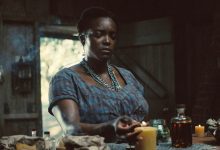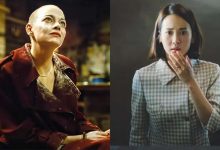Florence Pugh Shaved Head for We Live in Time Without Telling Marvel
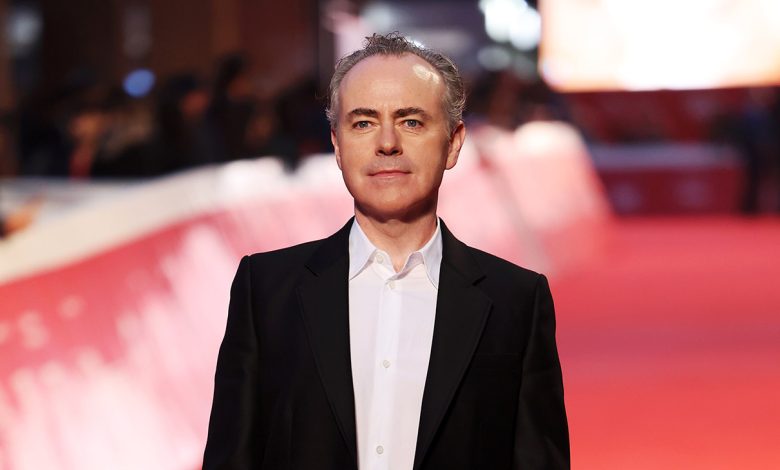
We Live in Time director John Crowley knew the level of excellence he’d be receiving from one of his most cherished former collaborators, Andrew Garfield, but it was Florence Pugh’s commitment to the nonlinear indie drama that managed to surpass any and all preconceived notions.
Oftentimes, stars prioritize their lucrative big-budget studio films, while their passion projects in the independent world have to work in the margins, both in terms of schedule and preparation. But in the case of Pugh and the role of Almut Brühl, she treated the Nick Payne-scripted romantic drama like it was as important as anything else, meaning she willingly shaved her head to play the part of a chef who risks, and later endures, a recurrence of ovarian cancer after starting a family with her boyfriend Tobias Durand (Garfield).
The rub of such a big choice is that in-demand actors like Pugh typically have other jobs lined up all year, and the spring 2023 production of A24’s We Live in Time was to be immediately followed by her central role as Yelena Belova in Marvel Studios’ Thunderbolts. Austin Butler faced an inverse situation when Dune: Part Two’s brain trust wanted him to go bald for baddie Feyd-Rautha Harkonnen, but he instead negotiated a bald cap so that Jeff Nichols’ subsequent shoot of The Bikeriders didn’t risk its financing due to the star having to sport a buzz cut or wig.
Undaunted, Pugh never hesitated about whether to go all the way with the haircut.
“She didn’t tell anybody [that she was shaving her head]. It was sort of terrifying to me. I was like, ‘Wow, that’s really ballsy,’” Crowley tells The Hollywood Reporter. “The first time I met her … she said, ‘Oh, by the way, I want to shave my head.’ And before I met her, I had assumed she would probably say to me, ‘What are we going to do about the shaving of the head?’”
Amid the WGA strike, Thunderbolts held on to its June 2023 production window for as long as possible, but by the end of May, they finally decided to fold up shop, which meant that Pugh’s bold move became moot. Regardless, Crowley is grateful that the actor, like Butler, gave all-too-rare precedence to a smaller project. (Oddly enough, Thunderbolts‘ previous two-month delay created the opportunity for Pugh to do We Live in Time first.)
“There’s this fearlessness in Florence, and she said, ‘No, it would be terrible. I hate bald wigs. It won’t work. You can’t do it,’” Crowley recalls. “The smaller, more independent film was the one where the actor was saying, ‘This is the one I’m going to pitch my stake in the ground for and not creatively compromise on.’”
Below, during a recent conversation with THR, Crowley also adds context to Garfield’s recent account of a sex scene that went on for far longer than it should have.
Coming out of The Goldfinch, what were you looking for en route to We Live in Time?
I was looking, on a looser scale, to not do another literary adaptation. That was the first thing. But the honest truth is that I’m always looking for a visceral reaction in a script rather than a genre choice. That said, when this script arrived, I already knew Nick’s [Payne] work. I directed a play by him in the theater ten years ago, and he’s a friend of mine. So I was very excited to read it, and there was a lot about it that then thrilled me. It was the fact that it was an original, and that it was set in a contemporary version of London that I recognized very well. It was also different to anything I had done before. It was maybe a little gentler and softer in a way, and it was a slightly different emotional tone. There’s obviously sadness and grief in things like Brooklyn and The Goldfinch, but it just felt different. It felt like a different aura. It was a move forward on some of the stuff I’ve done before, and it had two extraordinary roles for two great actors. And we lucked out with those roles.
Andrew Garfield, Florence Pugh and John Crowley on Set of We Live In Time Peter Mountain/A24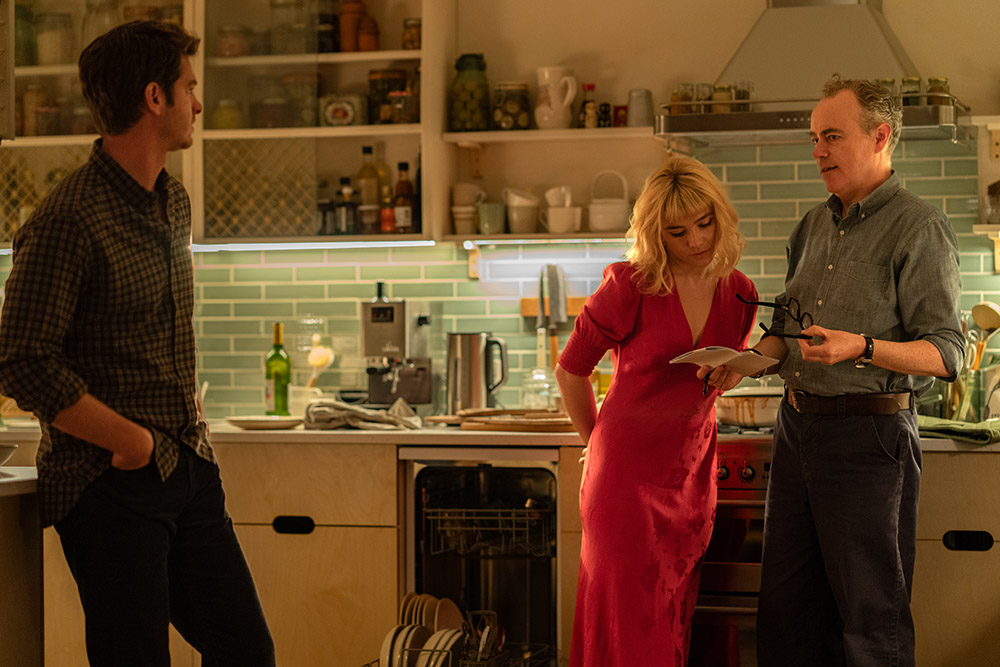
As far as your feature work, you’re one of the few filmmakers who’s still trying to make dramas. Is it getting harder and harder to get them made without having some kind of bend to them?
It certainly generates a degree of nervousness, which, to give my financiers enormous credit, they kept mostly away from me. But I could feel it in them that they were nervous about the thing that this was, despite these two amazing actors. There were a number of things that had to go right, and there were a number of bullseyes that had to be hit for it to get out to its audience. It’s only beginning its journey now, but it was very, very nerve-racking for everybody. I don’t feel that, personally, because I tried to make something that I might like to watch. If I like it and I’m moved by it and entertained by it, then hopefully there’ll be others if we can find where they are. But, yeah, it’s unfortunate that it’s a rare bird rather than a regular occurrence.
Florence Pugh would make the casting shortlist regardless, but did her past culinary exploits on Instagram factor into her casting at all?
I must admit that I’m not on Instagram, so I did not know that she was as passionate about cooking and eating. She has a wonderful joy in her around food, which is very infectious. So I didn’t know that. I was purely on her casting as an exact piece of psychological specificity. I thought she was really good casting for the role. She has a strength and also a degree of emotional scale, and if she could combine the two, then she could really light up Almut as somebody who’s holding the fear of what’s happening to her at bay by pushing the career side of herself. And when she finally cracks and shows her vulnerability in the big argument scene with Tobias in the kitchen, I knew that it would be heartbreaking.
You worked with Andrew Garfield before he was smashing laptops for David Fincher.
(Laughs.)
The Andrew of 2006’s Boy A set versus the Andrew of 2023’s We Live In Time set, is there a night-and-day difference?
Not night and day. He was very young then, and he was at the very start of his career. There was a huge amount of rather beautiful, almost puppy-like energy in him and a fear, a kind of anxiety, about whether he was going to get to do the things he clearly wanted to do with his career. Boy A was the first leading role he had played, and he was very anxious about that. There was a roiling anxiety about who he was in the world, and it fed straight into the character he was playing in a way that was heartbreaking. That was exactly the character’s dilemma in Boy A. Is that character going to get a second chance at life? Is he going to be allowed to see the horizon and see happiness coming towards him?
In the meantime, Andrew has gone on and done everything that he’s wanted to do in terms of his career, I think. He always was a stage actor, but he’s done some extraordinary stage work, some really big iconic roles on Broadway and here at the National in London. And in that time, he’s grown into a man and gained a degree of depth and experience. He carries all the emotional facets and complications of that with him, and he is still able to access that in his work. But the thing that’s the same is the creature that is as ambitious for the work as he is. There’s a restlessness in him that’s trying to get at the real truthful heart of the scene that you are working on together. That was there in his early twenties, and it’s still there in his early forties.
Andrew Garfield as Tobias in We Live In Time Peter Mountain/A24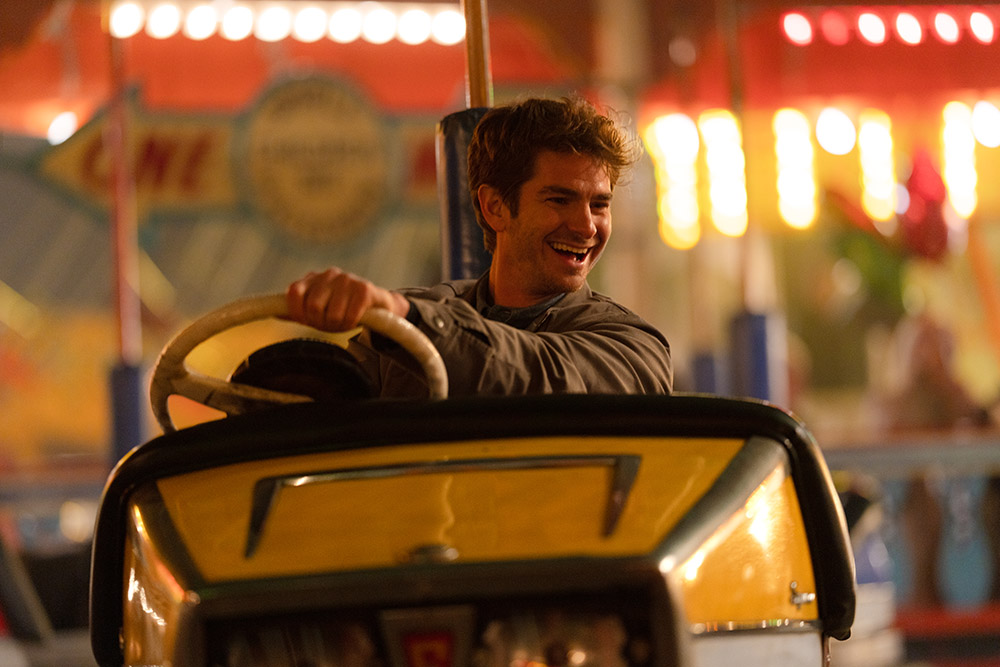
I presume the script was written nonlinearly, but how much does the final cut reflect that original sequencing of scenes? Did you still have to reorder a few scenes?
You’re very intuitively on the money with that. We reordered the whole thing, really. It was written out of sync. The three time frames were in the script, but it had a very different beginning, a very different end and a very different middle. It didn’t play as it was written, which is often the case with scripts. Things will read beautifully, and then the energy of the performances and the camera and something about the way the story unfolds just doesn’t work.
When we saw the first assembly, it didn’t flow like a river in the way that it was meant to, so we broke it apart and almost had to start again from the beginning. We had to find a different logic and a different way, which is about the emotional truthfulness of each moment and how it was speaking to the time in that relationship. We had these two extraordinary performances, which were giving a slightly different kind of valence and a different kind of power to spark things off each other.
So, yes, it was a long-ish edit, and it was quite head-wrecking at times. We had, as you can imagine, a wall full of all the index cards, and we had to keep finding ways to trick ourselves into seeing it with a degree of clarity because the structure was quite slippery. We’d get so far, and suddenly, you’d feel it stop working. So it’s a different order to the same end. We had to go and reinvent the wheel.
I spoke to Austin Butler and Jeff Nichols earlier this year …
I love Jeff Nichols. My God, I just revere him.
Likewise. We talked about Dune: Part Two’s desire to have Austin shave his head, and it would’ve put Jeff’s The Bikeriders in jeopardy if Austin had to sport a shaved head or a bad wig. So Austin worked it out and wore a bald cap for the sake of Jeff and his movie. Anyway, did Florence’s own buzz cut require any back and forth with Thunderbolts since that was supposed to go right after yours until the strike had its way?
Nope. She didn’t tell anybody.
Wow.
It was sort of terrifying to me. I was like, “Wow, that’s really ballsy.” The first time I met her was in a cafe to discuss this role, and we started chatting about the script and what she loved about it. And she said, “Oh, by the way, I want to shave my head.” And before I met her, I had assumed she would probably say to me, “What are we going to do about the shaving of the head?”
She was not available when we first approached her because of Marvel’s Thunderbolts, and we were just about to move on until Fiona [Weir], our casting director, said, “Let me just make one more call.” So she quadruple-checked just before we moved on, and that morning, a window had opened up. That film had moved back by eight weeks, and eight weeks was exactly what we needed. It was ridiculous. The day after we wrapped, she was supposed to go off to Georgia to shoot [Thunderbolts], because this was all before the strike, obviously.
There’s this fearlessness in Florence, and she said, “No, it would be terrible. I hate bald wigs. It won’t work. You can’t do it.” We still did all the homework on how you could do it. I assumed any actor would bring the same thing to my doorstep and say, “Look, I would love to do it if I didn’t have to do another job, but I’m going straight onto a huge job.” So it was the same scenario in the sense that the smaller, more independent film was the one where the actor was saying, “This is the one I’m going to pitch my stake in the ground for and not creatively compromise on.”
Florence Pugh as Almut in We Live In Time Peter Mountain/A24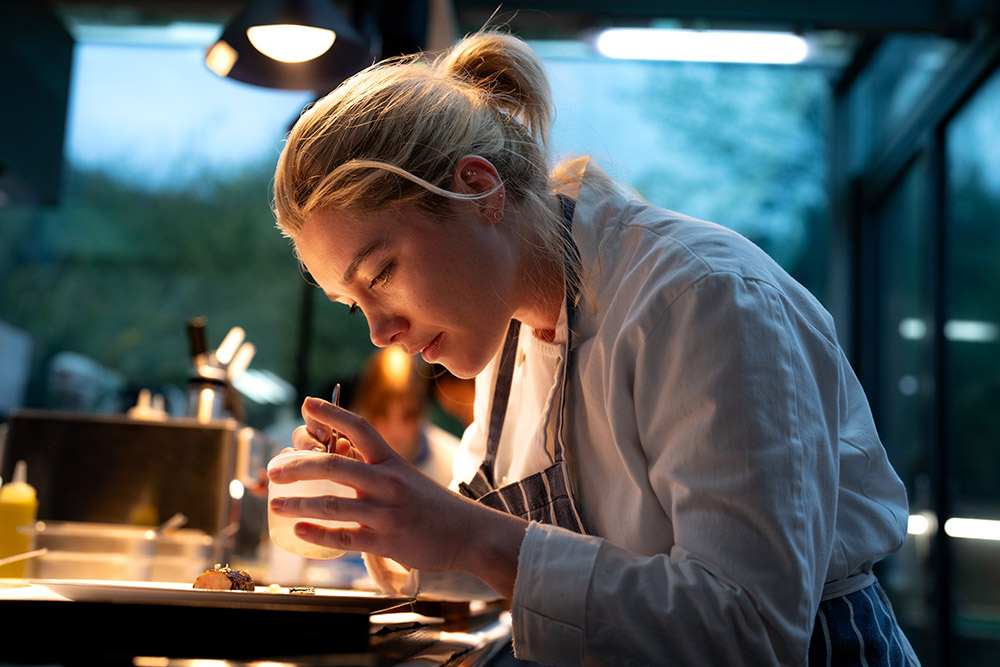
We’ve reached the image that captured the hearts and minds of the Internet. (This is a reference to the first-look photo of Pugh and Garfield’s characters next to a deranged-looking carousel horse.)
(Laughs.)
It honestly bums me out that films need some kind of viral component these days to start a conversation or drive interest. Sometimes, these things are forced or premeditated, but in your case, it happened all on its own. So how do you feel about it all?
I’m not on social media, so I’m a little bit of an old-fashioned head in that way. So it’s all curious to me, genuinely. And the first I knew of it was when one of the producers sent me the clip of [Stephen] Colbert’s monologue about [the carousel horse], which I thought was one of the funniest things ever. But he wound up by going, “We Live in Time, in theaters in October. Go see it.” There was that kind of thing, and it was an extraordinary kind of moment, really. So I don’t mind. I didn’t mind at all. I thought that it didn’t do us any harm, and all the memes and replacement posters were hysterically funny.
But after a couple of days, I was like, “Ooh, if this stays the mood music, then that would be really unfortunate, especially at that point in the film. If that scene is going to colonize that bit of the film, that would be devastating.” But, equally, those things are so way beyond our control now. I mean, who in any world could have spotted that that would be the thing? It would’ve been impossible. So you just have to go, “Okay, well, it’s better to be part of the pop culture conversation, and hopefully it’s for the right reason.” And thankfully, we came out of it the right way up.
Did its virality influence how you cut that montage in which the carousel horse partially appears? Or was it already locked?
Yes, it was [already locked]. I’ve watched it now with audiences from Toronto and New York to here in London, and I’ve never felt a flutter in the room. Maybe it’s happening in other places, but I’ve never felt that that’s what the scene becomes about or that people guffaw at it or that an extra element sticks its head up into the film. But to go back to your more serious point about how sad it is that things actually need that degree of non-film excitement to generate a degree of buzz, and I think it’s a fair point. It’s very unfortunate that film is not as central as it was in the culture, and that’s definitely a source of sadness.
Andrew told a story about the filming of a particular sex scene and how he and Florence carried on a bit too long after not hearing the word cut.
Correct.
I realize that talk show stories are not always the most detailed, but couldn’t cut be called a second or third time?
I’ll tell you why. It was in the cottage, and it was a closed set, so there were no other monitors on set. There was only my monitor, and I was in the room next door to them. It was just me and a script supervisor watching the scene. There was an intimacy coordinator, but the intimacy coordinator was in another room, and she was the only other person who was allowed access to the footage, separately, on that set.
And the way it would normally happen is I would call cut, but it’s verbal, because there isn’t a first [AD] in the room or anybody else to relay it, verbally. They would hear me through the walls of the cottage. It’s an old cottage, though, and the walls are made of stone. I’m also not somebody who shouts action or cut in an aggressive way. I will always speak to the actors in a way that doesn’t break something that they’re doing. It was a very delicate scene, and there’s only my DP, Stuart [Bentley], and Murph [Chris Murphy], our fabulous boom op in the room with them. And the way that it would happen is that they would do the scene, and I would call cut. Then both chaps in the room would turn to the wall and face away from the actors, which gave the actors a chance to get up out of the bed and put robes on. And once they’d settled themselves, they would shout out, “We’re ready,” as it were, for the people who have to come back in and do any adjustments between takes, including myself.
So there was a bit of confusion during the length of time after I shouted cut. Nothing was happening because, of course, the camera was cut and the image went dead. I also couldn’t hear anything going on in the room. And then, after a few minutes, I didn’t hear anybody go, “We’re robed. We’re ready to go.” So my script supervisor said, “Do you think they heard cut?” And I said, “Oh, you’re kidding.” So I shouted cut a second time, and then I heard giggling from inside the room. The actors were very funny about it. They were fantastic, and it was also testament to how easeful they were with each other. There was nothing odd about it other than [their likely thought of], “Okay, obviously it’s going well because he would’ve told us to cut if it wasn’t working.” It was the second or third time they had done the scene.
The poor cameraman-DP, Stuart, and Murph, it was their most embarrassing day on a film set. They were slightly traumatized by it because they were kind of making eye contact with each other. Neither of them would dream of shouting cut, and they just didn’t know what to do. They were so respectful of the actors and their process, and they wouldn’t dream of interrupting. So, yes, it is true. That’s how it came about. I shouted cut a bit louder for the next few takes.
***
We Live in Time is now playing in movie theaters.
Source: Hollywoodreporter
Related Posts
- Roundball Rocked: With NBA Return Looming, NBC Purges Scripted Roster
- SoundCloud Says It “Has Never Used Artist Content to Train AI Models” After Backlash on Terms of Service Change
- Fox News’ Camryn Kinsey Is “Doing Well” After Fainting on Live TV
- Kerry Washington and Jahleel Kamera in 'Shadow Force.'
Courtesy of Lionsgate
…
- This Alternative Artist Landed a Top-20 Chart Debut With an Album Made Almost Entirely on His Phone


